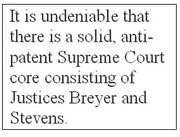![]() A response to Merges,
A response to Merges,
By Hal Wegner
Professor Robert P. Merges makes much sense in his op-ed piece, Back to the Shadows, or Onward and Upward? Current Trends in Patent Law. We and thoughtful supporters of the patent system share much common ground. Professor Merges touches on numerous points where there is hardly any significant difference with this writer, including the domestic results of the eBay decision from last year. In his analysis of the Supreme Court, Professor Merges is correct that the Court is generally “pro business”, but it is another matter whether in some industries being “pro business” means being “pro-patent”.
 “Pro Business” as Anti-Patent, a new Direction at the Court: Professor Merges is absolutely correct that the Supreme Court today is “pro-business”. Whether the majority is pro-patent is possible but not yet conclusively determined: It is too soon to tell. It is undeniable that there is a solid, anti-patent Supreme Court core consisting of Justices Breyer and Stevens. Justice Stevens’ anti-patent record reaches back to the mid-1970’s and is too well documented to question. Yet, Justice Breyer is apparently now the more enthusiastic anti-patent of the two; they are the only members of the Court in this century to have taken the view that the open door to § 101 patent-eligibility for “living” inventions in the Chakrabarty case should be narrowed, arguing in a dissent in J.E.M. that the utility patent law “does not apply to plants”.(1) Just last year, an anti-patent drumbeat manifested in the Breyer dissent from the Metabolite “DIG” (joined by Stevens) plus their joint participation in the Justice Kennedy concurrence in eBay further validates their anti-patent bias. Justice Souter joined both the Metabolite DIG dissent and the Kennedy eBay concurrence, but whether he is truly a solid part of an anti-patent core requires more data points; they may be forthcoming in shortly in KSR and in early Spring in Microsoft. Whether other members of the Court join this core remains to be seen.
“Pro Business” as Anti-Patent, a new Direction at the Court: Professor Merges is absolutely correct that the Supreme Court today is “pro-business”. Whether the majority is pro-patent is possible but not yet conclusively determined: It is too soon to tell. It is undeniable that there is a solid, anti-patent Supreme Court core consisting of Justices Breyer and Stevens. Justice Stevens’ anti-patent record reaches back to the mid-1970’s and is too well documented to question. Yet, Justice Breyer is apparently now the more enthusiastic anti-patent of the two; they are the only members of the Court in this century to have taken the view that the open door to § 101 patent-eligibility for “living” inventions in the Chakrabarty case should be narrowed, arguing in a dissent in J.E.M. that the utility patent law “does not apply to plants”.(1) Just last year, an anti-patent drumbeat manifested in the Breyer dissent from the Metabolite “DIG” (joined by Stevens) plus their joint participation in the Justice Kennedy concurrence in eBay further validates their anti-patent bias. Justice Souter joined both the Metabolite DIG dissent and the Kennedy eBay concurrence, but whether he is truly a solid part of an anti-patent core requires more data points; they may be forthcoming in shortly in KSR and in early Spring in Microsoft. Whether other members of the Court join this core remains to be seen.
Feeding this nascent anti-patent core are two dominant themes: First, while the Supreme Court is pro-business, a major segment of the business community is largely anti-patent, turning the patent system upside down: Under this twisted view of patents, being “anti-patent” may be “pro business”. Second, the patent jurisprudence of the Federal Circuit has created and continues to create problems that necessarily fuel further growth of an anti-patent sentiment.
To continue reading, become a Patently-O member. Already a member? Simply log in to access the full post.